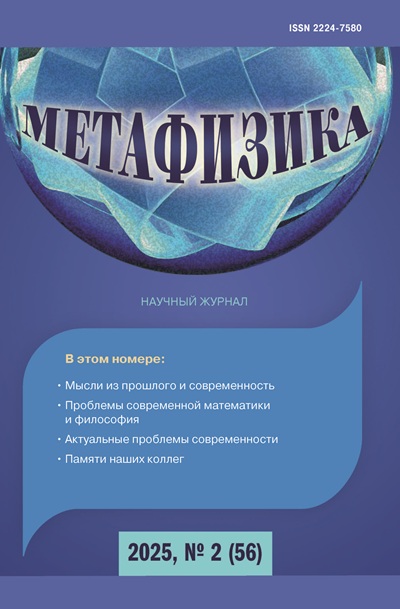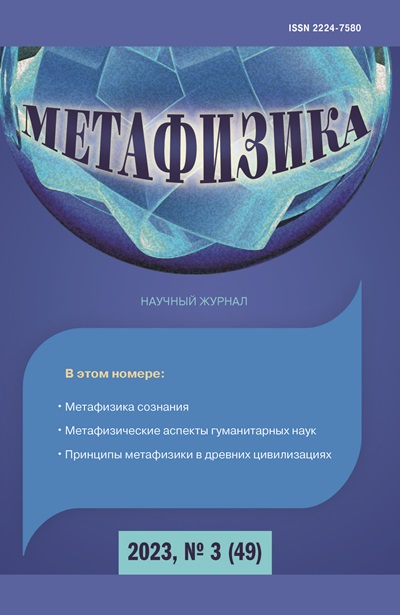No 3 (2023)
- Year: 2023
- Articles: 12
- URL: https://macrosociolingusictics.ru/metaphysics/issue/view/1733
- DOI: https://doi.org/10.22363/2224-7580-2023-3
Full Issue
Articles
 6-8
6-8


SPACE INTELLIGENCE
Abstract
Some aspects of the problems of space intelligence are considered when analyzing the hypothesis that the phenomenon of neural networks is not unique to humans, but can manifest itself in various natural objects that can be described by a neural network model based on the interaction (work) of simple automata. Such elements of Nature are, for example, space, a mycelium, a hive of bees, etc.
 9-29
9-29


MAN IN SPACE AND SPACE IN MAN OR A HYDRO-MECHANICAL ANALOGY OF THE STREAMS OF LIFE
Abstract
Based on the analysis of experimental data on the dynamics of a person’s physical condition and the activity of his organs, an extended interpretation of Kolmogorov’s hydrodynamic analogy is proposed. A satisfactory description by this physical model of the wave processes of life, starting from biological and ending with historical, creates a theoretical basis for its wide application in various branches of knowledge.
 30-37
30-37


THE MAGIC OF METAPHYSICS: SUPER-RECONSTRUCT OF THE SUBCONSCIOUS
Abstract
Algebraic unknown x is known virtually ( unknown-known ), ω actual infinity is virtually finite ( infinite-finite ), the transcendental number e is determined by the limit in which the variable is virtually constant ( variable-constant ). The excitement of the subconscious prepares the neutrality of the consciousness. Based on the two-level coordinates of the Cartesian square, a metaphysical clock is constructed.
 38-44
38-44


THE PROBLEM OF REFERENTS OF FUNDAMENTAL CONCEPTS
Abstract
The problem of the referents is that we do not know what the fundamental concepts (time, life, consciousness...), which are original for many sciences, mean. It is proposed to interpret those fragments of reality that are designated by these concepts as sign systems. This makes it possible to expand their content by using not only the causality relation, but also the selfreference relation, i.e. the relation that leads to the performativity of statements that prepare the referent of these dimensions of being. It is shown that the division of time contexts into physical (time) and grammatical time (tense) leads to self-referential relations and performativity of time, which allows using time as a general “generative grammar” for performative ordering in the mechanism of “preparation” of referents of the above fundamental concepts.
 45-66
45-66


THE RUSSIAN WORD: A PHENOMENOLOGICAL APPROACH
Abstract
The article is devoted to discovering the phenomenological potential of the word, which has Indo-European roots, and its consideration in the language of Russian traditional spiritual culture. The research interest to deep, essential semantics of a word-concept allows to present it as an “archetype of culture” (G. G. Shpet) and as a “live” phenomenon of the Russian spiritual tradition, restoring our cultural memory and our national self-consciousness.
 67-79
67-79


SACRAL, SPIRITUAL AND ENERGY IN THE RUSSIAN WORD
Abstract
The article is devoted to the analysis of the Russian word in different hypostases: 1) energetic, 2) sacred and 3) spiritual ones. The research deals with the Christian worldview focused on syncretic knowledge about God, the world and man. The article emphasizes the idea that not culture, but religion should be recognized as the most important category in a person's life, which determines traditions, customs, human behavior and religious identity. Language, which is a living product of the spirit, its most important activity and a number of other types of activity - art, philosophy, science, - will help to understand these problems.
 80-88
80-88


THE CREATIVE PATH OF A.F. LOSEV (STAGES AND DIRECTIONS): “GOING INTO THE ABYSS OF HISTORY...”
Abstract
In the article devoted to the 130th anniversary of the birth of the outstanding scientist, philosopher and theologian A.F. Losev, the main stages and directions of his creative path in the context of the formation of the national history of the twentieth century are considered. The question of the epistemological status of his works in the historical and cultural space of modern cognition is discussed. The stylistics of Losev’s thinking is analysed and the question about the prospects of studying his creative heritage is raised.
 89-104
89-104


THE CONCEPT “PERSON AND LIFE” AS THE MAJOR CATEGORY IN PHILOSOPHY OF CREATIVITY AND CULTURE OF MAXIM GORKY (ON THE MATERIALS OF HIS LETTERS)
Abstract
In the article, based on the material of M. Gorky’s letters, the concept of “man and life” is considered and investigated as one of the deep categories of his philosophy of artistic creativity and philosophy of life. It is traced how the theme associated with man, with human life, was gradually mastered by Russian literature since the end of the Middle Ages and how it was transformed and solved in Gorky’s work at the turn of the XIX-XX centuries. The thesis is formulated that, along with M.V. Lomonosov and A.S. Pushkin, Gorky is a symbol and embodiment of one of the most important periods in the development of Russian culture. It is proved that the purpose of literature, according to Gorky’s philosophy of culture, is to depict man as a creator and the highest stage in the development of nature. The qualities of a person that are integral to his social essence are identified and systematized. An assessment of the personality of the writer himself is given on the basis of numerous statements about him by domestic and foreign cultural figures. The role and significance of Gorky in Russian, Russian and world literature and culture is determined.
 105-117
105-117


METHODOLOGICAL FOUNDATIONS OF THE THEORY OF “LANGUAGE AND PERSONALITY”
Abstract
The article dwells upon the deterministic dependences of language and personality within the framework of the triangulation approach. The article analyzes the theory of personality in symbolic interactionism and the theory of personality of A.N. Leontiev, as well as the lifestyle theory in the Russian sociology. The author develops methodological prerequisites for the theory of “language and personality”.
 118-128
118-128


“DASMAN” - “MANKURT” - “IXROD”: CRISIS OF MODERNITY IN THE LATE PERIOD OF CHINGIZ AITMATOV’S ART
Abstract
The article is devoted to the historical and philosophical analysis of the work of the Kyrgyz humanist writer of the Soviet period, Chingiz Aitmatov, whose early work is characterised as a fascination with the “Soul of Faust.” (Spirit of Faust) The result of this was the writer’s earlier works, where he fervently perceives the ideas of progress, socialism, and enlightenment, in other words, the main ideas of the modern era. Later, under the huge influence of Russian classical literature, as well as active study of traditional Kyrgyz culture, he spoke on such fundamental metaphysical topics as people, personality, fate, morality, etc., thereby trying to get rid of the “Soul of Faust” (Spirit of Faust), more and more asserting himself as a traditional humanist. But despite these attempts, the writer still retained some ambivalence: on the one hand, he acted as a staunch critic of modernity, and on the other, he perceived the modernization process as an objective development of history that needs to be perceived and comprehended. The results of the writer's later ideas are new concepts such as “Mankurt” and “Ixrod” usually used to describe the consciousness of a person who became possible at the junction of modernity with tradition. To a certain extent, these concepts are identical to the idea of “DasMan” by M. Heidegger. This indicates that after the Second World War, a critical understanding of the ideals of modernity reigned among European intellectuals, to which Chingiz Aitmatov also adjoins.
 129-143
129-143


CREATIVES OF THE METAPHYSICS OF ANCIENT INDIA
Abstract
In ancient Indian philosophical texts, the problems of metaphysics are intensively and comprehensively discussed. In the texts, creative processes and their final results - creatives - are expressed through the relationship of original ontological, epistemological, axiological principles and categories. The system and the logic of their development are being reconstructed.
 144-155
144-155









